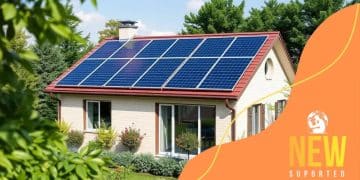The rise of modular homes and their benefits

The rise of modular homes offers cost-effective, sustainable, and customizable housing solutions, appealing to modern buyers seeking quick construction and energy efficiency.
The rise of modular homes is transforming the housing landscape, offering flexibility and sustainability. Have you ever considered how these homes might meet your needs? Let’s dive into their advantages.
Understanding modular homes
Understanding modular homes is the first step towards realizing their potential benefits. These homes are built in sections, or modules, in a factory setting before being transported to the site for assembly. This method not only streamlines the building process but also ensures quality control.
Features of Modular Homes
One significant feature of modular homes is their versatility. Homeowners can customize their layouts and designs to fit their preferences. Unlike traditional homes that may take months to complete, modular homes can often be constructed in a fraction of the time.
- High-quality construction standards
- Reduced construction waste
- Energy efficiency options
- Faster building process
Moreover, the construction of modular homes often leads to quicker completion times compared to traditional building methods. This advantage can be particularly beneficial for families looking to move into a new home promptly. Additionally, because the modules are built in a controlled environment, they tend to be more resilient to weather-related damage during construction.
Benefits of Modular Construction
Another advantage of modular homes is their sustainability. Many builders focus on using eco-friendly materials and energy-efficient designs, which can lower utility costs for homeowners.
- Potential for lower energy bills
- Less environmental impact during construction
- Options for renewable energy sources
In addition to being cost-effective, these homes can blend seamlessly into various landscapes. Whether in a city or a rural area, modular homes can be designed to fit the surroundings and attractively enhance the community.
Benefits of modular housing
The benefits of modular housing are extensive and appealing to many homebuyers today. One major advantage is the cost savings associated with this building method. Because modular homes are constructed in a factory, labor and material costs are often lower than traditional home construction.
Cost-Effective Solutions
Many people find that modular homes can be a more budget-friendly option. Lower construction costs typically result in lower home prices, making homeownership more achievable.
- Reduced labor costs
- Less material waste
- Faster construction timelines
In addition to cost, modular housing has a significant positive impact on sustainability. The controlled manufacturing process minimizes waste and can lead to more energy-efficient designs.
Energy Efficiency
Many modular homes are built with eco-friendly materials and can incorporate advanced insulation and energy-efficient systems. This means homeowners can enjoy lower energy bills and a smaller carbon footprint.
- Smart home technology integration
- High-efficiency appliances
- Solar energy options
Another benefit of modular housing is the speed at which these homes can be constructed. Unlike traditional homes that may face delays due to weather, modular homes can be built quickly regardless of outdoor conditions.
This fast-paced construction offers the chance to move into a new home sooner, making it especially attractive to families needing a timely solution. Additionally, the flexibility of designs available allows for customization, letting homeowners create spaces that meet their specific needs and lifestyles.
Sustainability in modular construction

Sustainability in modular construction is a key topic as more people prioritize eco-friendly living. Modular homes are designed with sustainability in mind, utilizing advanced building techniques that minimize waste and reduce environmental impact.
Reduced Waste Generation
One of the standout features of modular homes is their potential to create significantly less waste compared to traditional building methods. In a controlled factory environment, materials can be precisely measured and used efficiently, which reduces off-cuts and excess materials.
- Better material management
- Reduced off-site waste
- Recyclable and sustainable materials
Additionally, many manufacturers are committed to using eco-friendly materials. These materials are often sourced sustainably and designed to be biodegradable or easily recyclable. This focus on renewable resources enhances the overall sustainability of modular construction.
Energy Efficiency
Another significant aspect is energy efficiency. Modular homes can incorporate high-quality insulation, energy-efficient windows, and modern heating and cooling systems. This leads to lower energy consumption and reduced utility bills. Homeowners can often enjoy significant savings while also reducing their carbon footprint.
- Advanced insulation techniques
- Energy-efficient appliances
- Solar panel options
This emphasis on energy-efficient design not only benefits the environment but also promotes long-term savings. By building homes that are naturally energy-efficient, modular construction plays a crucial role in sustainable living for families and communities.
Cost-effectiveness of modular homes
The cost-effectiveness of modular homes is one of the main reasons they are becoming increasingly popular. By being built in a factory, these homes allow for significant savings, both in construction time and expenses.
Reduced Construction Costs
One of the primary benefits of modular homes is the lower cost associated with their construction. Labor costs are reduced because a large part of the work is done in a controlled environment. This efficiency leads to savings that can be passed on to buyers.
- Fewer labor hours required
- Bulk purchasing of materials
- Less on-site labor delays
In addition to reduced labor costs, the modular home building process typically generates less waste. This means that builders save money on materials and can create homes that are more environmentally friendly.
Lower Maintenance Costs
Once constructed, modular homes often require less maintenance than traditional homes. This is partly due to higher quality control during the building process. Homeowners can expect their modular homes to be durable and built to last.
- Quality materials
- Modern building techniques
- Fewer construction defects
In many cases, modular homes come equipped with energy-efficient features that can lower utility bills. Through better insulation and energy-saving systems, homeowners can enjoy comfortable living spaces while saving money every month.
Overall, the cost-effectiveness of modular homes makes them an appealing alternative for many buyers. With less money spent on construction and maintenance, these homes provide a solid investment for families looking to settle down.
Trends in modular home design
Trends in modular home design are evolving rapidly as more people seek innovative and sustainable living solutions. Modern consumers desire homes that not only meet their needs but also reflect their personal style.
Open Floor Plans
One popular trend is the use of open floor plans. This design allows for flexibility in how spaces are used, making homes feel larger and more connected. With fewer walls, the natural light can flow throughout the space, enhancing the overall atmosphere.
- Enhanced natural lighting
- Flexible use of space
- Better flow for entertaining
Another significant shift in modular home design is the integration of smart home technology. Homeowners now prioritize connectivity, using apps to control lights, heating, and security systems. This technology adds convenience while improving energy efficiency.
Sustainability Features
The desire for sustainability is also becoming a hallmark of modern designs. Many builders are incorporating energy-efficient materials and systems. Features such as solar panels, green roofs, and sustainable building materials are becoming standard options.
- Use of eco-friendly materials
- High-efficiency appliances
- Water-saving fixtures
Outdoor living spaces are another trend influencing modular home design. Patios and balconies are designed to extend living areas, allowing homeowners to enjoy nature while still being close to home. This integration creates a seamless transition between indoor and outdoor environments.
Ultimately, these trends reflect a broader movement toward more personalized, eco-conscious living. As the demand for modular homes continues to grow, so does the variety in design options catering to modern lifestyles.
FAQ – Common Questions About Modular Homes
What are the cost benefits of modular homes?
Modular homes typically have lower construction costs due to reduced labor and material waste, making them more affordable than traditional homes.
How sustainable are modular homes?
Modular homes are built with eco-friendly materials and often include energy-efficient features, reducing their overall environmental impact.
Can I customize a modular home design?
Yes, modular homes offer a variety of customizable designs to fit the homeowner’s preferences and needs.
How quickly can I move into a modular home?
Modular homes can be constructed much faster than traditional homes, often allowing for quicker move-in times due to the efficient building process.






